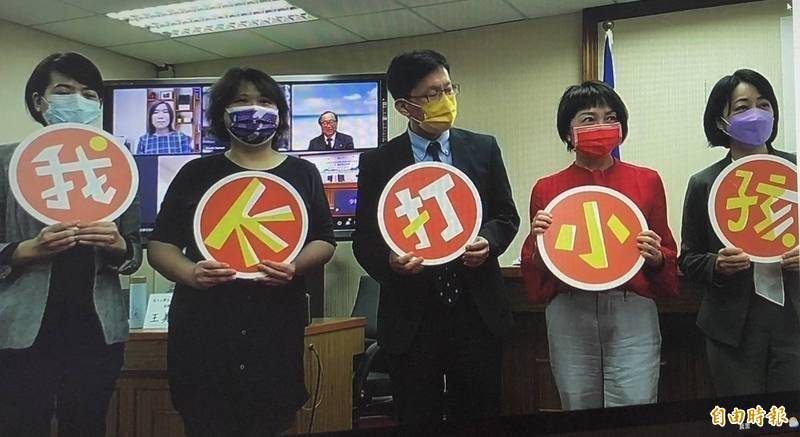The Ministry of Justice has recently cooperated with the proposal to amend the civil law. Parents "shall not engage in physical or mental violence against their children." In the future, whether it is physical punishment or psychological humiliation, it may be regarded as illegal, and the worst punishment can be the suspension of parental authority.
The picture shows the press conference held by the Humanism Educational Foundation last year, "To implement zero corporal punishment at home, what should the government do?"
(provided by Renben)
[Reporter Wu Zhengfeng/Taipei Report] The United Nations Convention on the Rights of the Child prohibits corporal punishment of children, but Article 1085 of my country's Civil Code still grants parents the right to discipline. In order to conform to international trends, the Ministry of Justice recently revised the proposal to state that parents "shall not commit physical or mental violence against their children." In the future, whether it is physical punishment or psychological humiliation, it may be regarded as illegal, and the punishment for indiscriminate punishment is the heaviest to stop parental authority.
If the public has opinions on the amendment prohibiting "corporal punishment in the home", they can submit their opinions before April 13.
Article 1085 of the current Civil Code stipulates that "parents may discipline their children within the necessary scope", but the Convention on the Rights of the Child, which has been incorporated into Taiwan's domestic law, states that "children shall not be subject to any form of physical or mental violence, injury, abuse, or neglect when they are under the care of their parents. or negligence, mistreatment or exploitation, including sexual abuse”, the two laws have different frameworks on whether parents have the right to discipline, and there are concerns about conflicts.
Please read on...
General Comment No. 8 of the Convention on the Rights of the Child calls on countries to amend laws to "prohibit violence in the family, no matter how minor, including in the form of disciplinary punishment" and "there is absolutely no justification for the use of violent, cruel or degrading forms of discipline". ", "Corporal punishment or humiliating punishment must be clearly prohibited in civil and criminal laws", "All forms of violence are prohibited... Parents can no longer use reasonable or slight corporal punishment".
Considering that many countries such as Germany and France have banned corporal punishment by parents, South Korea and Japan, which are closer to our culture, have also completed their amendments in the past two years. The ministry's letter explained that it will cooperate with the revision of the law and change it to "Parents should take into account the age and development level of their children when protecting and cultivating their minor children, respect their personality, and refrain from physical and mental violence against their children" to meet the requirements of the Convention on Children's Rights.
In the future, slapping, choking, insulting, punishing kneeling in the street, or even denying food are all illegal acts; as for non-contact parenting such as punishing standing and writing, it depends on the length of time, frequency, place, development level, etc. It can only be judged by considering whether it exceeds the burden of children or violates human dignity.
Parents punish their children indiscriminately. In addition to ordering them to receive parental education in accordance with the Children and Youth Welfare and Rights Protection Act, the court can also declare the suspension of parental rights in accordance with Article 1090 of the Civil Code.
If a child is seriously violated physically or mentally, the parent may also be entrusted to sue the perpetrator for compensation.
Although the amendment prohibits physical punishment and verbal humiliation, it emphasizes that it does not oppose the concept of positive discipline. Parents should raise children in a way that is conducive to growth, meet their children's physical and psychological needs, and adopt positive and non-violent discipline methods.
In addition to the amendments to the Civil Code, the Ministry of Health and Welfare also intends to study the Children's Rights Law, and relax the definition of "physical and mental abuse (repeated, overburdened)" to "freedom from any form of violence."
Our country has already banned corporal punishment of children in schools and institutions. If the amendments to the Civil Code and the Children's Rights Law prohibiting "corporal punishment at home" are passed, the goal of "zero physical and mental violence to children" is expected to be the last piece of the legislative puzzle.
Liberty Newsletter cares about you: If you suspect that a child has been physically abused, mentally abused, or sexually assaulted, or sexually harassed, please call the 113 special line. Through the connection service of professional social workers, children in life crisis can be rescued as soon as possible.
